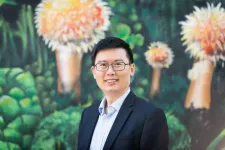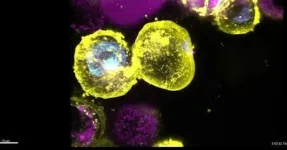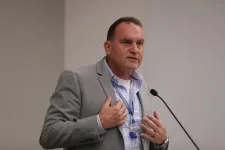(Press-News.org) A pair of Cockrell School research teams are part of a massive semiconductor grant program from the National Science Foundation that includes funds from industry leaders and the federal CHIPS Act.
The projects are part of the NSF Future of Semiconductors (FuSe) program through a public-private partnership between NSF and four major tech companies: Ericsson, IBM, Intel and Samsung. FuSe aims to enable rapid progress in new semiconductor technologies and manufacturing as well as workforce development.
Altogether, the program will support 24 research and education projects through 61 awards to 47 institutions totaling $45.6 million.
"The significance of semiconductor research in the technological landscape cannot be overstated," said Diana Marculescu, department chair in the Cockrell School of Engineering's Chandra Family Department of Electrical and Computer Engineering. "These NSF FuSe awards mark an initial step towards positioning us as a leading global institution in semiconductor research under the CHIPS Act."
The Projects: Li Shi, professor in the Walker Department of Mechanical Engineering, and electrical and computer engineering professor Xiuling Li are leading a project focused on heterogeneous integration of two types of semiconductors, gallium nitride and boron arsenide. Boron arsenide conducts heat much more efficiently than current-generation materials and can help to prevent overheating of operating devices. This team, which also includes researchers from The University of Texas at Dallas, University of Michigan-Ann Arbor, and The Ohio State University, aims to enhance performance and energy efficiency of semiconductor devices. The project also includes workforce training components, such as course materials and new courses on semiconductor materials and devices, annual Semiconductor Day with Industry, and Woman in Semiconductors Club, to provide training to students from diverse background and prepare them for the future-generation workforce of the semiconductor industry.
Working with researchers at Washington University in St. Louis, Massachusetts Institute of Technology, University of California Los Angeles, electrical and computer engineering professor Deji Akinwande is developing a groundbreaking technique for next-generation semiconductor processors using ultra-thin, two-dimensional semiconductor materials. The work will advance semiconductor technologies, integrating materials research, electronic devices, and innovative circuitry, while also including educational components for students, workshops and collaborations with semiconductor companies.
Why It Matters: There is a significant push to improve semiconductor manufacturing, innovation and research in the U.S. in the wake of pandemic-era supply chain shortages that impacted everything from medical devices to automobiles. Additionally, researchers around the world are working to improve semiconductor capabilities to support next-generation technologies heavy on processing, such as artificial intelligence, autonomous vehicles and more.
Future semiconductors and microelectronics will require a broad coalition of science and engineering talent in academic and industrial sectors to pursue holistic, "co-design" approaches that advance materials, devices and systems integration. Co-design approaches simultaneously consider the performance, manufacturability, recyclability and environmental sustainability of such materials, devices, and systems.
"Our investment will help train the next generation of talent necessary to fill key openings in the semiconductor industry and grow our economy from the middle out and bottom up," said NSF Director Sethuraman Panchanathan. "By supporting novel, transdisciplinary research, we will enable breakthroughs in semiconductors and microelectronics and address the national need for a reliable, secure supply of innovative semiconductor technologies, systems and professionals."
END
Texas engineers land semiconductor grants through CHIPS Act-backed NSF program
2023-10-03
ELSE PRESS RELEASES FROM THIS DATE:
Gut bacteria found in wild wolves may be key to improving domestic dogs’ health
2023-10-03
BEND, Ore. – Gut microbes found in wild wolves may be the key to alleviating a debilitating gastrointestinal condition common to domestic dogs, according to a study led by researchers at Oregon State University – Cascades.
In a paper published in Applied Microbiology, the authors report a novel strain of Paenibacillus bacteria with characteristics of a probiotic – an organism that conveys a health benefit to the host.
In this case, the benefit would be to head off canine inflammatory ...
Host genetics helps explain childhood cancer survivors’ mortality risk from second cancers
2023-10-03
(MEMPHIS, Tenn. – October 02, 2023) The population of childhood cancer survivors in the U.S. is increasing, with an overall childhood cancer survival rate greater than 85% five years after diagnosis. However, survivors can still be at increased risk of various health conditions, including second cancers. Using data from the Childhood Cancer Survivor Study (CCSS) and the St. Jude Lifetime Cohort Study (St. Jude Life), scientists at St. Jude Children’s Research Hospital have identified a genetic ...
How floods kill, long after the water has gone – global decade-long study
2023-10-03
With New York declared a state of emergency following flash flooding, there is increasing concern such events will become more common globally.
Now a study led by Monash University scientists in Australia has found that people impacted by a flooding event are at significantly increased risk of dying – including heart and lung problems – in a crucial window between three and six weeks after the event, even after the flooding has dissipated.
The study, published today in the BMJ, found that the risk of dying increased and persisted for up to 60 days (50 days for cardiovascular mortality) after a flooded day - increasing by for 2.1% for all-cause deaths, 2.6% for cardiovascular ...
USC joins LA-area stem cell institutes in forming a regenerative medicine consortium
2023-10-03
USC is partnering with seven of Los Angeles’ leading regenerative medicine institutes to form the Los Angeles and surrounding area regenerative medicine consortium (LA-RMC), with the goal of fulfilling the promise of the California Institute for Regenerative Medicine (CIRM): to develop laboratory discoveries into treatments for patients with unmet medical needs.
CIRM, the voter-created agency that provides public funding for stem cell research in California, is dedicated to advancing regenerative medicine, which uses stem cells and related approaches to treat disease and disorders. Regenerative ...
When cells go boom: study reveals inflammation-causing gene carried by millions
2023-10-03
Australian researchers at WEHI have found that a genetic change that increases the risk of inflammation, through a process described as ‘explosive’ cell death, is carried by up to 3% of the global population.
The study may explain why some people have an increased chance of developing conditions like inflammatory bowel disease or suffer more severe reactions to infections with bacteria like Salmonella.
At a glance
MLKL is a gene essential to triggering necroptotic cell death – a natural process that protects our body from infection. In some people this process can go awry and ...
Study from Fukushima shows even low doses of radiation may contribute to diabetes
2023-10-03
New research to be presented at this year’s Annual Meeting of The European Association for the Study of Diabetes (EASD), Hamburg (2-6 Oct), suggests that exposure to low doses of radiation may contribute to an increased risk of diabetes.
The study by Dr Huan Hu and Dr Toshiteru Ohkubo from the Japanese National Institute of Occupational Safety and Health involved more than 6,000 out of around 20,000 emergency workers who responded to the radiation accident at the Fukushima Daiichi Nuclear Power Plant, which was hit by a huge tsunami in March 2011.
Substantial amounts of radioactive materials were released into the environment following explosions at the ...
Worldwide audit finds testosterone replacement improves blood sugar control in men with type 2 diabetes
2023-10-03
Real-world data from an ongoing international audit of testosterone deficiency in men with type 2 diabetes, being presented at this year’s Annual Meeting of The European Association for the Study of Diabetes (EASD), Hamburg (2-6 Oct), suggests that testosterone replacement therapy (TRT) improves glycaemic control for up to 2 years.
The early data from 37 centres across 8 countries who have so far joined the Association of British Clinical Diabetologists (ABCD) audit [1], suggest that the reason that HbA1c (a measure of average blood sugar levels over the past 2-3 months) continues ...
Semaglutide significantly improves blood sugar control and weight loss in adults with type 2 diabetes for up to 3 years in real-world study
2023-10-03
New research presented at this year’s Annual Meeting of The European Association for the Study of Diabetes (EASD), Hamburg (2-6 Oct), shows that treatment with the drug semaglutide significantly improves blood sugar control and weight loss in adults with type 2 diabetes for up to three years.
“Our long-term analysis of semaglutide in a large and diverse cohort of patients with type 2 diabetes found a clinically relevant improvement in blood sugar control and weight loss after 6 months of treatment, comparable with that seen in randomised trials”, says Professor Avraham Karasik from the Institute of Research and Innovation at Maccabi Health Services ...
Drinking dark tea every day may help control blood sugar to reduce diabetes risk
2023-10-03
Drinking dark tea every day may help to mitigate type 2 diabetes risk and progression in adults through better blood sugar control, suggests new research at this year’s Annual Meeting of The European Association for the Study of Diabetes (EASD), Hamburg (2-6 Oct).
The study, by researchers from the University of Adelaide in Australia and Southeast University in China, found that compared with never tea drinkers, daily consumers of dark tea had 53% lower risk for prediabetes and 47% reduced risk for type 2 diabetes, even after taking into account established risk factors known to drive the risk for diabetes, including age, ...
UC Riverside startup company wins prestigious NIH grant
2023-10-02
Soon after he joined UC Riverside in 2015, Maurizio Pellecchia, a professor of biomedical sciences in the UCR School of Medicine, began working with the UCR Research and Economic Development office to create on campus an incubator space. He envisioned that space as a home for UCR scientists to create startup companies to prove the commercial potential of their technologies. That multi-year effort helped create in the Multidisciplinary Research Building the EPIC Life Sciences Incubator that currently houses young companies in agricultural technology, biomedical technologies, bioengineering, and medicinal chemistry.
One of the tenant companies in the incubator ...





